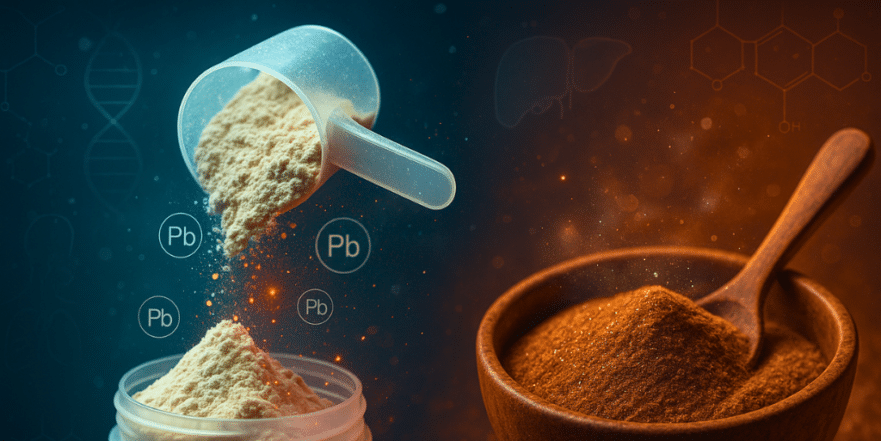
You reach for that plant-based protein powder or sprinkle some cinnamon on your oatmeal, thinking you’re making a healthy choice. But what if these ‘superfoods’ contain a hidden toxin? It might be shocking to hear, but recent investigations have uncovered alarming levels of lead in popular plant-based protein powders and even in common cinnamon spices, raising serious questions about what’s really in the food you eat.
Key Takeaways
- High Lead Levels Found: Recent tests by Consumer Reports and the U.S. Food and Drug Administration (FDA) revealed dangerously high levels of lead in some plant-based protein powders and cinnamon products.
- The Source of the Problem: Lead contamination often originates from polluted soil, which is absorbed by plants like rice, peas, and hemp as they grow.
- Processing Concentrates Toxins: The process of drying and grinding plants into powders can unfortunately concentrate the amount of lead already present in the plant.
- Serious Health Risks: Lead is a potent neurotoxin with no safe level of exposure, posing significant risks to brain development in children and causing long-term health issues in adults.
- How to Protect Yourself: Experts recommend choosing whole foods over processed powders and looking for products with third-party testing certifications to ensure safety.
Why Are Plant-Based Products at Higher Risk?
You might assume that anything plant-based is automatically healthier, but that’s not always the case. According to food policy expert Darin Detwiler, these products can be more prone to contamination. Lead is a heavy metal that naturally exists in soil, but decades of industrial pollution, mining, and pesticides have increased its presence. Plants used for protein powders—like rice, peas, and hemp—absorb these contaminants directly from the ground. Unlike dairy-based proteins, which are filtered through an animal, plant proteins come straight from the soil to your shaker bottle, bringing the absorbed lead with them. In fact, Consumer Reports found that plant-based powders had lead levels nine times higher than dairy-based ones.
The Powder Problem: How Processing Makes It Worse
Turning a plant into a fine powder involves drying and grinding, a process that can concentrate any lead that the plant has absorbed. This means that even a small amount of lead in the raw plant can become a much bigger problem in the final powdered product. Furthermore, many protein powders and spice blends contain multiple ingredients. If just one of those ingredients is contaminated, it can spoil the entire batch, making it difficult to trace the source and putting you at risk without you even knowing it.
The Undeniable Dangers of Lead Exposure
So, why is this such a big deal? Lead is a dangerous neurotoxin. The Centers for Disease Control (CDC) and the World Health Organization (WHO) are clear: there is no safe level of lead exposure for children. Even tiny amounts can cause permanent brain damage and developmental issues. Adults aren’t immune, either. Long-term exposure to lead can contribute to nerve damage, kidney disease, heart problems, and memory decline. The risk is especially high for pregnant people, older adults, and anyone with chronic health conditions.
What You Can Do to Stay Safe
One of the biggest challenges is that the U.S. lacks clear, unified laws that limit lead in all food products. While some guidelines exist, there isn’t a single federal rule for all foods and supplements, except for those made for children. This leaves you, the consumer, in a tough spot. To protect yourself, experts recommend avoiding daily use of protein powders—especially those made from rice, hemp, or peas—unless the product has been tested for contaminants by a third party. Look for certifications from trusted organizations like NSF, USP, or Informed-Choice on the label. Ultimately, the safest bet is to prioritize whole foods over highly processed powders for your nutritional needs.
The Takeaway: Be a Smart Consumer
While protein powders are marketed as a key part of a healthy lifestyle, the potential risks of lead contamination may outweigh the benefits. By being a cautious and informed consumer, you can make better choices to protect your health. When in doubt, choosing cleaner, natural, and whole-food alternatives is always the safest path.
Sources and Further Reading
- Consumer Reports: Protein Powder and Lead Contamination Studies. https://www.consumerreports.org/
- U.S. Food and Drug Administration (FDA): Lead in Food, Foodwares, and Dietary Supplements. https://www.fda.gov/food/metals-and-your-food/lead-food-foodwares-and-dietary-supplements
- Centers for Disease Control and Prevention (CDC): Lead Poisoning Prevention. https://wwwcv.cdc.gov/nceh/lead/
- World Health Organization (WHO): Lead Poisoning. https://www.who.int/news-room/fact-sheets/detail/lead-poisoning-and-health

